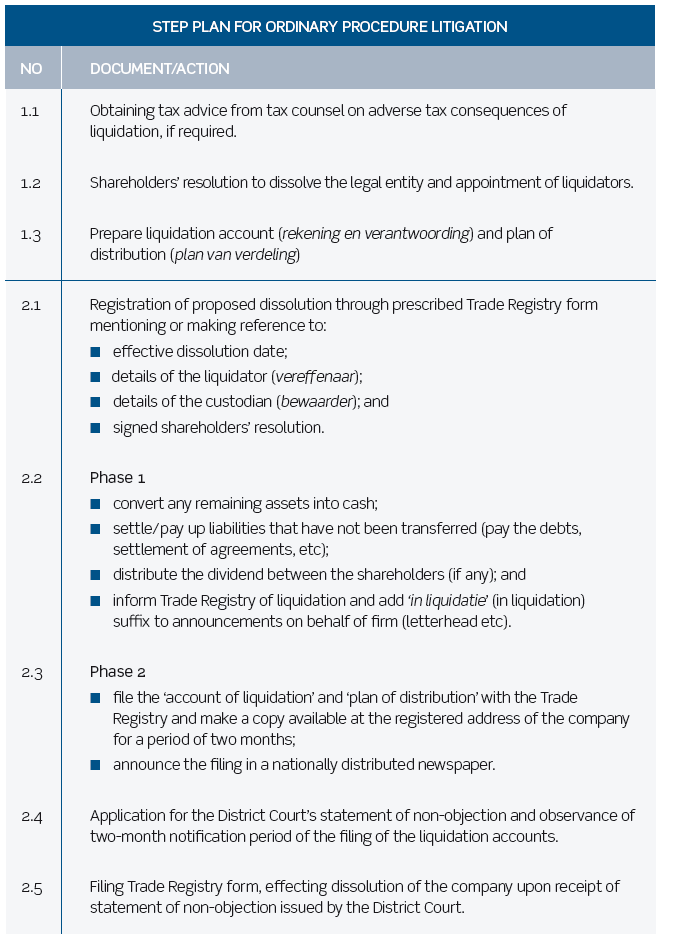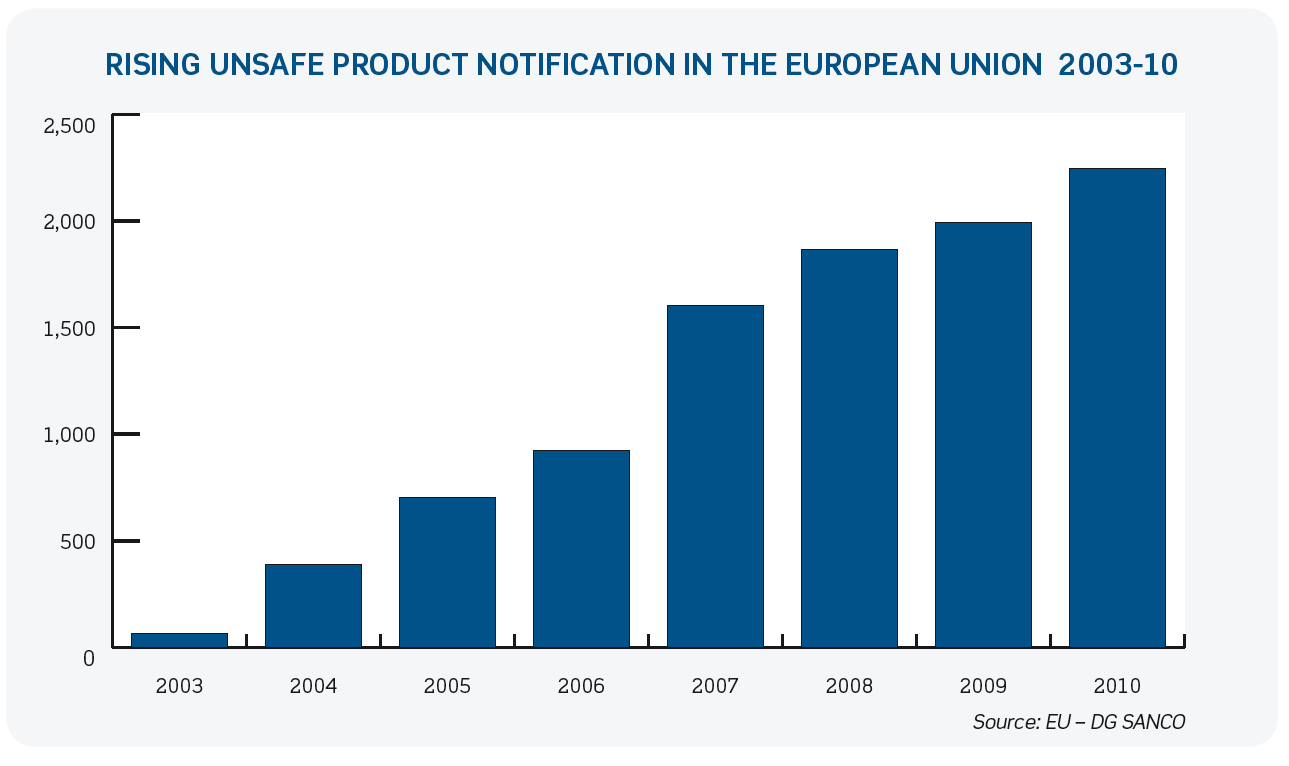Any manufacturers exporting products directly into the US accept the litigious culture as a commercial fact of life. In fact, some manufacturers make a conscious decision not to sell into the US for that very reason. But manufacturers outside the US are still at risk of litigation if the products they make end up there, whether by distribution by others or as a component in another product. Continue reading “When can international manufacturers be sued in the US?”
Liquidating Dutch BV companies – an overview
A critical review of corporate structure may result in the conclusion that more can be done with fewer corporate entities. Often our firm is approached by clients that would like to implement a legal entity rationalisation programme aimed at achieving cost efficiency. In the following article, typical issues to be dealt with when liquidating and deregistering a Dutch private limited liability company (besloten vennootschap or BV) entity are discussed.
This article intends to give an insight into the formalities and procedures under Dutch law that have to be considered when the liquidation and/or the winding-up of a Dutch BV is contemplated. Continue reading “Liquidating Dutch BV companies – an overview”
Araci v Fallon – are all bets off for American Cyanamid?
On Saturday 4 June 2011 the Court of Appeal granted a prohibitory injunction preventing Kieren Fallon, one of the best known flat-racing jockeys in the country, from racing in the most prestigious event of the flat-racing calendar, the Epsom Derby. This article discusses the Court of Appeal’s decision. It then goes on to consider the possible impact of this decision on the traditional American Cyanamid test for the granting of injunctive relief and on the approach of the courts to the granting of injunctive relief more generally. Continue reading “Araci v Fallon – are all bets off for American Cyanamid?”
Resolution of domain name disputes in Vietnam
With nearly one-third of the Vietnamese population online, the role of the internet in both domestic and international commerce has grown substantially in recent years. According to The Economist, one-quarter of Vietnamese enterprises has used the internet to receive and place orders, with 12% using internet marketplaces to trade goods.1 While trade names serve to identify ‘bricks and mortar’ retailers, in the online commercial environment, domain names are the primary identifiers of source for goods and services. Such identifiers carry particular significance in countries like Vietnam, where the population maintains a relatively high awareness of brand use online.2 ? Continue reading “Resolution of domain name disputes in Vietnam”
Indian data privacy rules: impact of recent changes
It’s been a long time coming, but in April this year the Indian government brought its data privacy rules into line with European requirements.
The recent changes raise a couple of questions for UK businesses:
- How do they affect transfers of personal data to group companies or suppliers based in India?
- Will they impact the way in which Indian suppliers provide services?
This note provides a brief overview of the changes and a summary of their impact on UK businesses, by addressing the questions above. Continue reading “Indian data privacy rules: impact of recent changes”
Legal rights and duties in data
Data is increasingly central to many, if not most, sectors: businesses are focusing as never before on protecting and exploiting their own data, and getting access to others’ data that they need on the best terms. This increases pressure in the market place between the data customer/ buyer and the data vendor, and these pressures are starting to play themselves out in more open legal confrontation. Continue reading “Legal rights and duties in data”
Reinforcing the doctrine of severability
In SMS Tea Estates Pvt Ltd v M/s Chandmari Tea Co Pvt Ltd [2011], the Supreme Court addressed the following questions posed for its consideration:
- Whether an arbitration agreement contained in an unregistered (but compulsorily registrable under the Indian Registration Act 1908) instrument was valid and enforceable?
- Whether an arbitration agreement in an unregistered instrument that was not duly stamped, was valid and enforceable?
- Whether in the facts and circumstances of the case, there was an arbitration agreement in existence between the appellant and the respondent, and whether an arbitrator could be appointed?
Family migration – the next target
The government continues to look at ways of reducing net migration to tens of thousands per annum rather than the hundreds of thousands that have been admitted annually over the last decade. Having removed the highly skilled route under Tier 1 (General) and imposed a rigorous system of caps and quotas to sponsored migration under Tier 2, the government is turning its attention to routes to settlement and family migration. Continue reading “Family migration – the next target”
Product recalls: damned if you do, damned if you don’t?
Whilst few product recalls grab the headlines in the way of Toyota’s worldwide recall of millions of Prius and other vehicles, product recalls are happening all the time as can readily be seen from newspapers, store advertisements, government agency announcements and a variety of other media. Barring rare cases of malicious tampering, each recall represents a breakdown of risk management, whether in design, manufacture or packaging, in communicating necessary information about the product’s characteristics, or in foreseeing ways in which a product might be innocently misused. Continue reading “Product recalls: damned if you do, damned if you don’t?”
Amendments to Dutch telecoms law restricts the use of cookies
On June 22 2011, the Dutch parliament adopted ten out of eleven amendments to the Telecommunication Act in order to implement revised European privacy, electronic communications and telecom directives. Only the amendment on internet access as a universal service was rejected. With these measures, the Netherlands will most probably become one of the first countries in the world to enshrine the concept of network neutrality into national law by banning its mobile telephone operators from blocking its customers or charging consumers extra for using internet-based communications services as Skype. Continue reading “Amendments to Dutch telecoms law restricts the use of cookies”
Corporate risk and reputation: the brand, consumer trust and the media
Consumer engagement, particularly online, is key to creating and maintaining trust in a brand. Post-recession distrust means that brands have to carefully consider their reputation risk strategy. Developing a risk strategy to prevent a crisis is key to ensuring that the company, and those at its helm, are well prepared for any activity that could lead to media scrutiny. This article explores the broader themes of corporate and executive reputation protection and our specific recommendations for taking control of your company’s reputation. Continue reading “Corporate risk and reputation: the brand, consumer trust and the media”
Cost of careless talk
In Spring v Guardian Assurance [1995], the House of Lords held that an employer who provided a reference owed an employee a duty to take reasonable care in the preparation of that reference. Therefore, failure to do so could lead to a claim for negligence if the employee suffers damage as a result.
HR departments and in-house legal teams often have safeguards and checks in place to ensure that care is taken when providing a reference. Of course, it is only right that a personal reference should be composed thoughtfully and fairly. Those safeguards are also a sensible measure against the potential threat posed by disgruntled ex-employees. Continue reading “Cost of careless talk”



